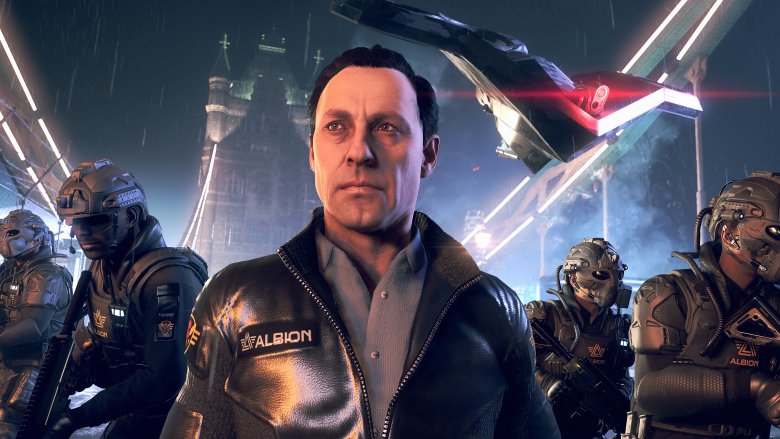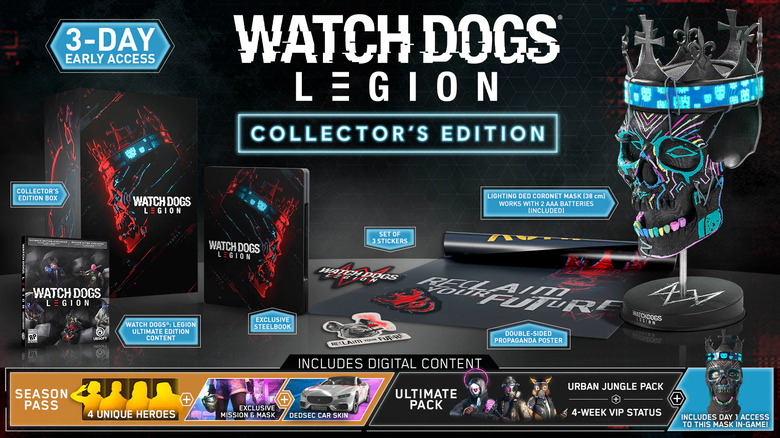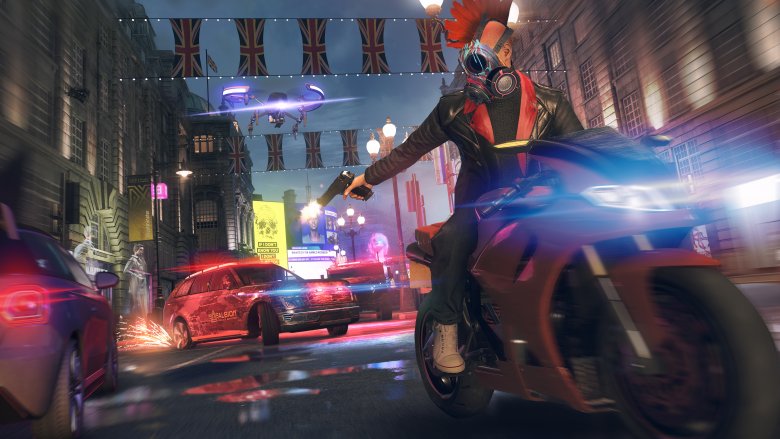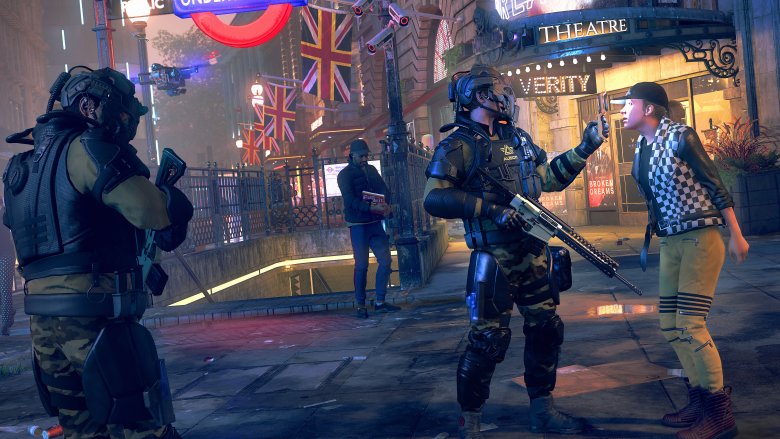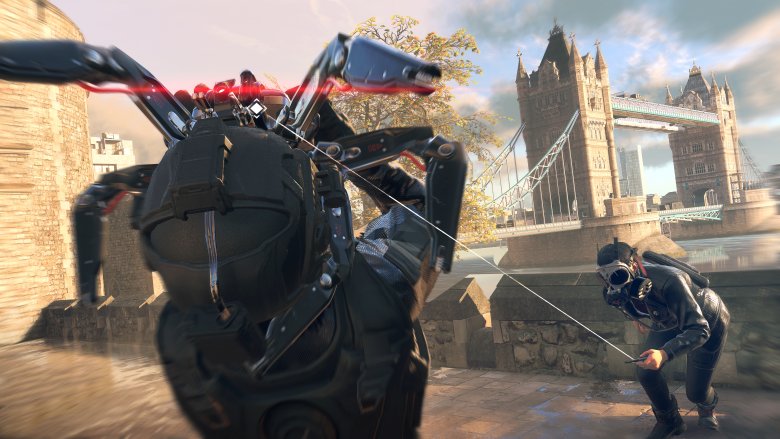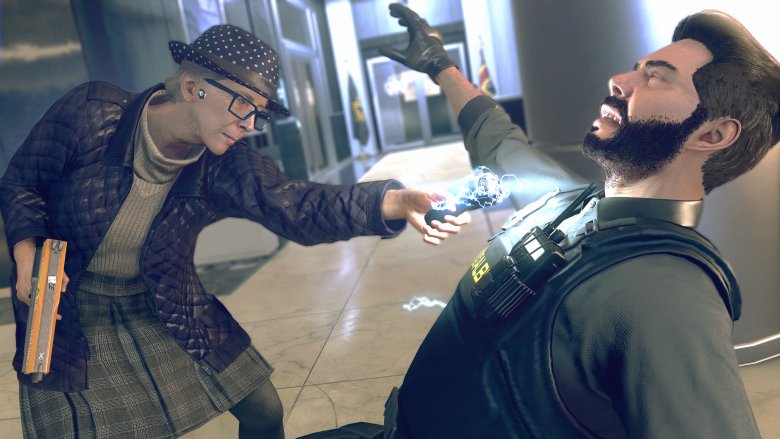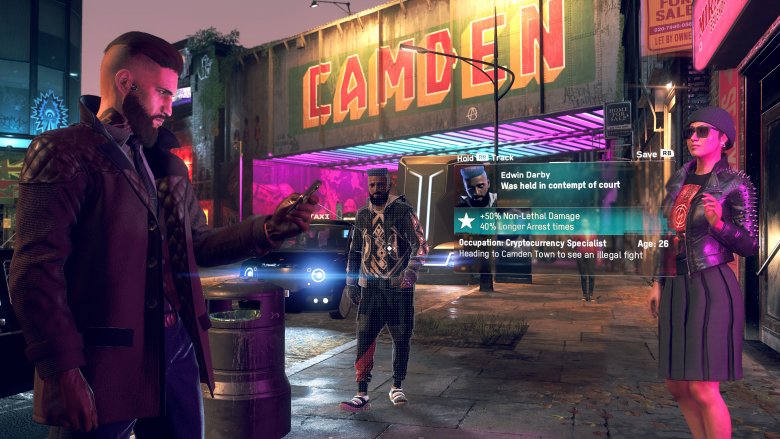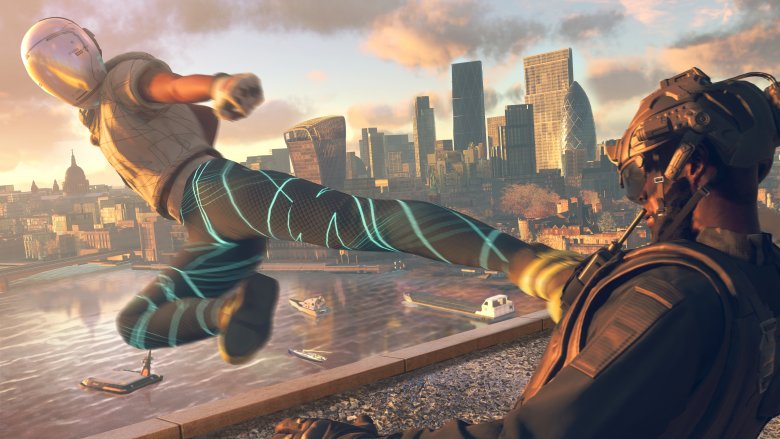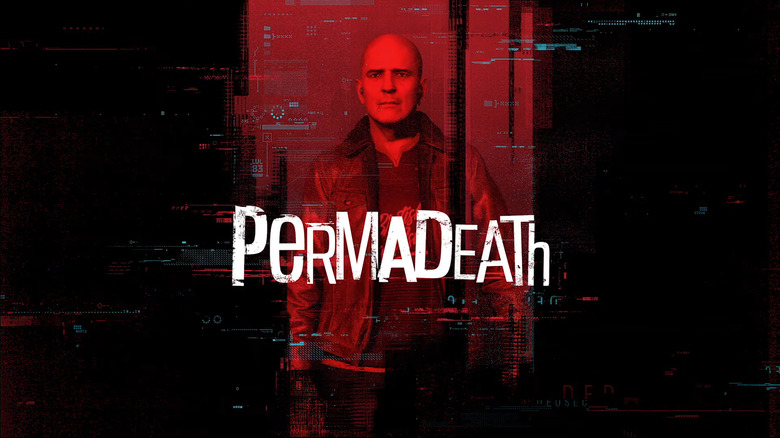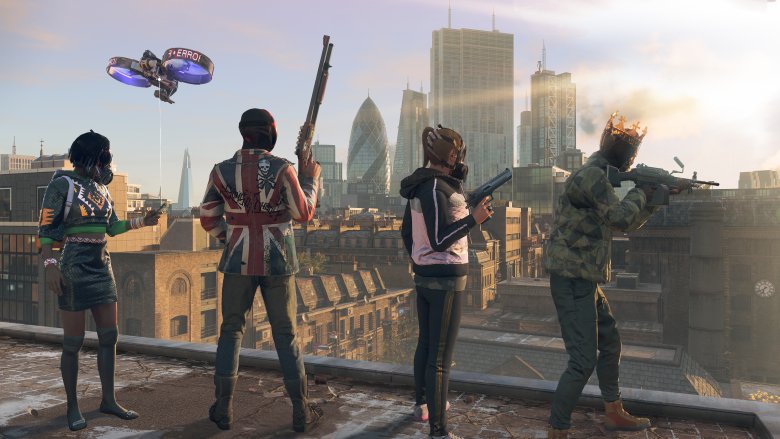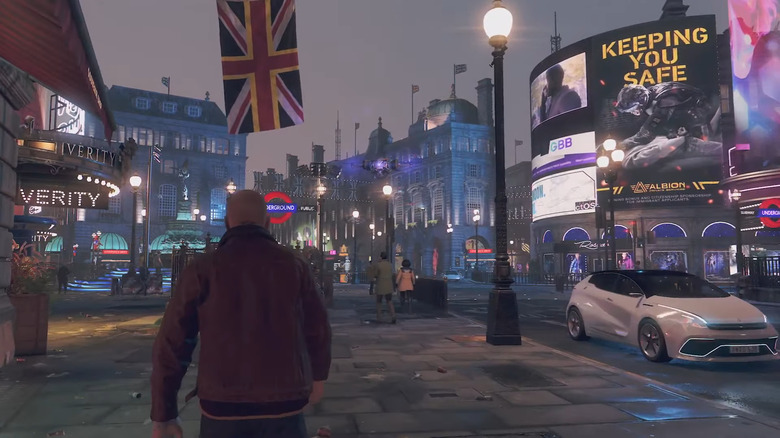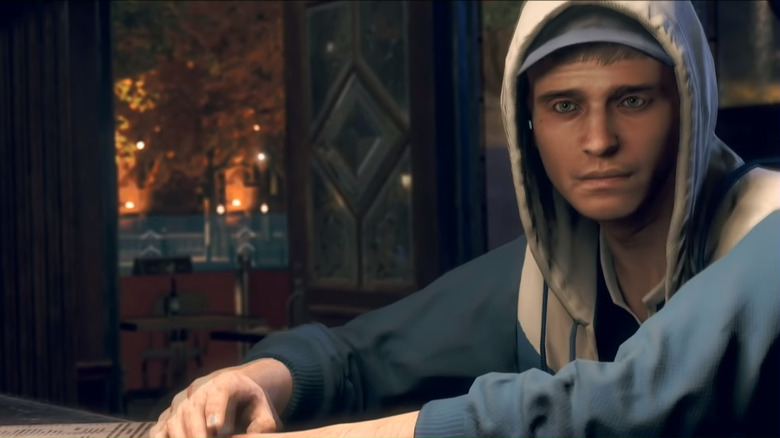Watch Dogs: Legion Release Date, Trailer, Pre-Order And Gameplay
In a world overrun by tyrannical governments and overbearing surveillance, a small group of rebels fights for the freedom of the people. By using cutting edge technology and the latest in hacking techniques, they dismantle the oppressive government, one mission at a time. These rebels call themselves DedSec, and the Watch Dogs series puts you in their shoes.
Rumors were swirling around, hinting at where Ubisoft would take the franchise next. And then just days before E3 2019, the publisher confirmed the title of the next game: Watch Dogs: Legion. Since then, we've learned a lot about the game and its newest setting, London. We also know more about the protagonist (or, more accurately, protagonists) that we'll take control of.
If you haven't been keeping up, we've got you covered. Whether you're new to Watch Dogs or eagerly anticipating Legion, you've come to the right place. We gathered everything you'll need to know about Ubisoft's next open-world game set in a cynical future.
Watch Dogs: Legion's release date
When Ubisoft first revealed Watch Dogs: Legion at E3 2019, it set a firm release date of March 6, 2020. However, just four months later, the studio pedaled back on that. In October, they released a statement about delaying the game, along with a few other upcoming titles. As of now, Watch Dogs: Legion is set for a release some time in fiscal year 2020-2021, which could mean any time between April 2020 and March 2021.
This isn't necessarily a bad thing for the game. After all, later deadlines give developers more time to polish Watch Dogs: Legion. The first few months of 2020 also contain some heavy hitters, like Final Fantasy 7 Remake, Animal Crossing: New Horizons, Doom Eternal, and, of course, Cyberpunk 2077. Legion isn't the only 2020 game getting more polish; The Last of Us Part 2 recently delayed its release as well.
Ubisoft also delayed Gods & Monsters as well as Rainbow Six: Quarantine to the same fiscal year. CEO Yves Guillemot expressed disappointment with the company's recent titles, particularly Ghost Recon: Breakpoint, for missing sales expectations. He hopes that these delays will improve the brands of future titles.
Watch Dogs: Legion pre-orders and special editions
Because this is Ubisoft, there's no shortage of Watch Dogs: Legion special editions to peruse. Pre-ordering any version of the game gives you the Golden King Pack, which contains car, mask, and gun skins.
The next step above the standard edition is the Gold Steelbook Edition. Coming in at $109.99, physical versions get a steelbook (obviously), three-day early access to the game, and the season pass. The pass includes four heroes and missions, along with another exclusive mission, mask, and car skin.
Next up we have the Ultimate Edition for various prices, depending on your retailer. It comes with everything in the Gold Edition except a steelbook. If you want a steelbook, you'll have to order exclusively through GameStop for $129.99. Otherwise, you'll also find the Urban Jungle Pack here, which gives you three characters and masks. Additionally, you'll have four weeks of VIP status, which lets you earn experience and money faster.
Finally, there's the Collector Edition for $189.99, sold exclusively through Ubisoft's store. It comes with a big box, an exclusive steelbook, some stickers, and a poster. You'll also find an exclusive mask replica, which you can use in-game as well.
Watch Dogs: Legion is committed to Stadia
Watch Dogs: Legion joins a long list of Ubisoft games that are slated to be on Google's premier platform. Previously, Google confirmed that many of Ubisoft's big ticket titles, like Assassin's Creed Odyssey, Tom Clancy's The Division 2, and Tom Clancy's Ghost Recon: Breakpoint, would make their way to Stadia. After Ubisoft officially revealed Legion, the company also confirmed players could stream it on launch.
This tight partnership should come as no surprise, if you've been paying attention. Previously, in 2018, Ubisoft CEO and co-founder Yves Guillemot said that he believes streaming is the future for video games. Furthermore, he thinks that the next generation of consoles will be the last. Afterward, it will all be streaming, at least in his vision of the future.
Ubisoft demonstrated this belief back toward the end of 2018. The company partnered with Google when it tested out Project Stream, which we now know as Stadia. Ubisoft offered free PC copies of Assassin's Creed: Odyssey as a guinea pig for the project.
Subscribe for more
Watch Dogs: Legion will also go live on a new subscription service called Uplay+. Unveiled at E3 2019, Ubisoft's newest initiative asks people to pay $14.99 a month for unlimited access to a suite of games. Similar to Microsoft's Xbox Game Pass, this service promises more than 100 games. Where Uplay+ differs, however, is that so far, only Ubisoft titles are slated to be in its library.
Uplay+ goes live on Sept. 3, and Legion will be available to subscribers the day it launches. Additionally, it's worth noting that those who play the game via this service get access to the most premium digital edition of the game. In other words, you'll essentially have the Ultimate Edition of Legion, season pass and all. You'll also be able to play the game earlier than launch, and if, for example, a multiplayer beta rolled out, that would be included in your Uplay+ subscription.
The world of Watch Dogs
The Watch Dogs games are set in a fictionalized version of our world, but a lot of it is still grounded in reality. They take place in a near future where surveillance technology has taken over major cities. Called the Central Operating System (or ctOS), this surveillance system has turned the world into a dystopia, where the few control everything.
The first game takes place in Chicago, and you control Aiden Pearce, a vigilante who tries to hunt for his niece's murderers to keep the rest of his family safe. He uses his smartphone to take over various devices around him. Through social engineering and hacking, he works with a rebel group called DedSec to topple ctOS and dismantle its control over the streets of Chicago.
Watch Dogs 2 has a similar premise, although it takes place in San Francisco instead. Here, the surveillance has been upgraded, with the new system now going by ctOS 2.0. The protagonist, Marcus Holloway, was wrongly incriminated thanks to ctOS. He joins DedSec, but ultimately, it's up to you to help him exact his vengeance on the system.
Across the pond to London
In February 2017, Watch Dogs 2 received a patch that added a new ending cutscene. Fans thought this alluded to a sequel to the franchise, and that sequel would be set in London. Come 2019, we found out the fans were right, but things are darker than people might have expected.
Legion isn't just set in London: it's set in a post-Brexit version of London. For the characters in the game, Brexit is far in the past. Furthermore, creative director Clint Hocking has carefully laid out that the political issue was not the cause of ctOS's rise in this fictional world. Instead, he claims the problems that caused Brexit are the same ones that cause the rise of ctOS.
Whatever the case, things aren't looking good for the United Kingdom in this gloomy imagining of a technological future. Not only has the nation divorced from the European Union, it's also experiencing its own internal unrest. Scotland left the UK at some point before Legion, and the people of London are antsy. In other words, it's the perfect atmosphere to stage a coup against oppressive surveillance technology.
Ubisoft gets political — sort of
Setting a game about mass surveillance in post-Brexit London is a pretty politically loaded concept. Surveillance is already a talking point in the UK, and pairing that with a heavily debated political issue sounds like it would have a punchy message behind it. However, that might not be the case.
Guillemot believes their games are about presenting players with information that makes them ask questions. Take The Division 2 as an example. The White House acts as home base for the player while terrorist groups are trying to start a new civil war. Sounds political, right? Yet, creative director Terry Spier denied any political messages behind the narrative.
In June 2019, Ubisoft published an interview with Tommy Francois, Vice President of Editorial. In it, he backed up Guillemot's view: "We want [the players] to decide what they like, what they don't like, and if and how to change their minds or the way they play based on that information."
On the other hand, Hocking has said, "[Legion] has a message for sure." So who's to say how political this game will be?
Watch Dogs: Legion gameplay: Hack everything
Much like the last two Watch Dogs titles, Legion is all about using technology to your advantage. Generally speaking, the game is a third-person open-world shooter, and you have an assortment of lethal and nonlethal weapons at your disposal. You can also melee nearby enemies. However, you also carry a few other powerful gadgets that can neutralize enemies and open new pathways.
As an example, you can control a little drone that can infiltrate locked-down locations. This little guy hugs enemy faces to stun them, and he can do so from afar with a stun gun. Additionally, you'll always have access to your smartphone, which is a gateway to all sorts of game mechanics.
In general, you can pull out your smartphone to scan NPCs in the world. This brings up their background information, which helps you decide who to recruit. Furthermore, you can hack certain devices from afar, like enemy phones. This distracts them, opening them up for a takedown.
Londoners are your protagonist
Yeah, you read that heading right. You don't play as Aiden or Marcus or any other handcrafted, single character. Legion takes its title literally, in that you play as a legion of rebels in London. One minute, you could be playing Ian Robshaw, and the next, you're controlling Helen Dashwood. Up to 20 NPCs at a time can be recruited to join your cause, and each one has their own strengths and weaknesses.
When producer Sean Crooks says any NPC can become a PC, he means any. The only ones you can't recruit, as he explicitly stated, are children, for obvious reasons. Aside from the kids, almost anyone can be played. Even enemies you spare in the line of duty can be recruited, according to some previews.
Each character can be molded into three classes, depending on their skills. Enforcers play the muscle of your group, excelling in taking down enemies. Infiltrators take a stealthier, more roundabout approach to missions, and they can even hack into people's brains to see what they see. Finally, Hackers do what they do best: use their drones, or take over enemy drones, to control any situation.
Introducing permadeath
When you hear the term "permadeath," the roguelike genre comes to mind. Ubisoft isn't selling Legion as a roguelike, but permadeath is definitely a new concept for its open world games. When one of your characters takes critical damage, a screen pops up, asking whether you want to surrender or fight to the gritty death. If you continue to fight, you regain control of your character, allowing you to deal with whatever's killing you however you can. You could run, or you could fight head on and try to win. If you die here, though, say goodbye to your operative forever.
Surrendering leads to that agent going to jail, according to developer Kent Hudson. This means you can't control that character again for some time, but in some cases, that's better than losing them permanently. Although, no one's stopping you from hacking into enemy systems to shorten their sentence a bit. Furthermore, if you recruit a lawyer, they can stop characters from getting jailed in the first place. Nonetheless, the 20-agent limit suddenly seems generous when you know you could lose one at any time.
Flipping the script
By now you're wondering how well crafted our protagonist(s) can be. If Ubisoft plans for you to recruit at least 20 people across your playthrough, surely they can't be as fleshed out as, say, Marcus from Watch Dogs 2. Well, that's why Hocking plans to pull out all the stops to flesh out these characters. After all, it takes a lot of work to bring the people of a major city to life.
In an interview with Edge magazine, Hocking revealed that the team wrote 20 different versions of the script. In each version, the main character — whoever it is you're controlling — acts completely differently. The words they say and how they say it differ from script to script.
"There are 20 different versions of Legion's script and I don't just mean people saying the same lines," said Hocking. "We're talking different characters, different personas, different voices, different acting."
The team plans to take things one step further. Even if you have two characters who happen to be pulling from the same script, the developers plan to modulate the voices in different ways, still changing the experience.
Watch Dogs: Legion multiplayer: Hack together
If 20 agents aren't enough for you, maybe the prospect of multiplayer might entice you to check out Legion. The game will feature a four-player co-op mode, letting you team up with three others to tackle missions. These missions will be exclusive to the online mode, meaning that people playing the single-player campaign can't access them.
You also have access to more than just missions. You can also engage in side activities, like bare-knuckle boxing or street art tagging. There are promises to keep this multiplayer mode afloat with regular updates.
This isn't necessarily surprising. Watch Dogs and its sequel both had multiplayer modes as well. The first game featured online racing, a different take on capture the flag, and a unique cat-and-mouse mode. The second game had co-op missions for two players, and up to four players could roam the open world together.
Impressions: Legion puts NPCs in the spotlight
After being announced at E3 2019, certain members of the press got a chance to play Legion. PC Gamer's UK editor-in-chief, Samuel Roberts, walked away from the game very impressed. In his piece titled "Watch Dogs Legion is the most impressive E3 demo I've played in years," he wrote a little anecdote about one of his characters, who ended up dying right before his eyes. In the end, he felt attached to the character, and he marveled at how "the game's big idea is working."
"Just 45 minutes in this city full of potential heroes has captured my imagination, though, and made me want to test how far the simulation can go," he wrote.
Meanwhile, The Verge's games editor Andrew Webster shared a similar sentiment, albeit with more skepticism. He found the premise ambitious, which he admits is for the better with this franchise. However, he thinks it all depends on how the recruitment system shakes out in the long run: "Legion could either end up as a vibrant, constantly changing experience, or one filled with a bunch of main characters that all seem largely the same."
Too complex for human testing
In a few interviews, Watch Dogs: Legion associate producer Shelley Johnson spoke about the scale of the game. Ubisoft procedurally generates all the people that live in post-Brexit London, and she claims that puts the number at somewhere around nine million playable characters. That daunting scale makes Legion one of the most ambitious projects the developer has tackled.
With all these moving parts, Legion has challenged Ubisoft in many ways. For one, keeping these grand promises is turning out to be expensive for the company. Additionally, its sheer scale has gone beyond the limits of what human quality control can cover. Johnson claims that if more games down the line continue to aim for this level of complexity, they may need to resort to something beyond human capabilities: "We really are crossing over into the need for AI to start picking up some of the heavy lifting when it comes to testing the game because of the complexity."
Nonetheless, she's confident that this game, unlike the first Watch Dogs, will deliver on its big promises.

